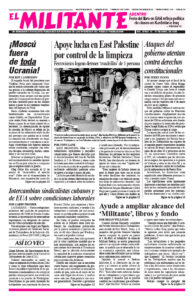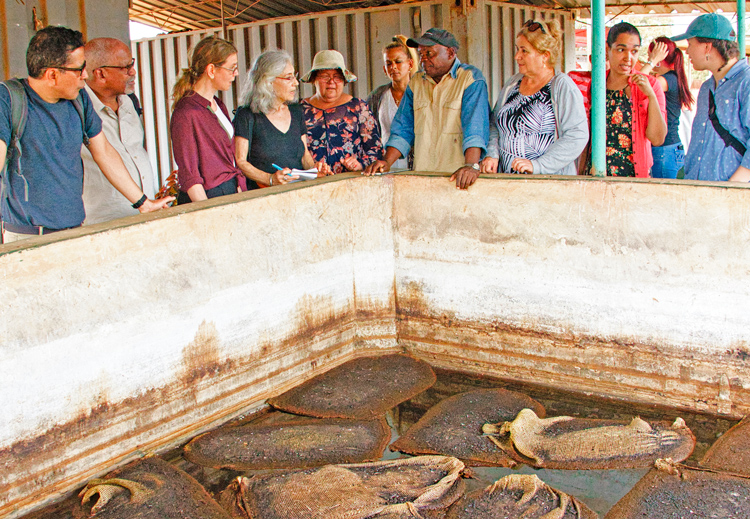GÜINES, Cuba — Farmers at a cooperative here are part of efforts by Cuba’s working people and their revolutionary government to boost agricultural production and reduce dependence on costly food imports.
“Last year was very hard,” said Yunaiky Cruz, president of the Cuban-Bulgarian Friendship Agricultural Cooperative, which produces a variety of vegetables, including potatoes, which are in short supply across the island, as well as raising some livestock.
He pointed to the brutal impact of Washington’s six-decade-long economic embargo against the Cuban people, the consequences of which intensify the impact on Cuba of the worldwide crisis of capitalist production and trade. This is exacerbated by the cost of the COVID-19 pandemic, and now Moscow’s war against Ukraine.
Cruz was addressing a group of socialist workers from the U.S. and the United Kingdom who visited the farm Feb. 24 at the invitation of the National Association of Small Farmers (ANAP). Accompanying them were Idia Ruiz, editor of ANAP’s magazine; ANAP journalist Jorge Sariol and photographer Carlos Parodi and local leaders of the farmers association. The cooperative is 30 miles southeast of Havana.
Top among the challenges, Cruz noted, are shortages of fuel, fertilizer, insecticide and spare parts for farm equipment. “We used to buy chemical inputs from Mexico, Brazil, Spain and Italy,” he said. “But Cuba’s imports from those countries collapsed during the pandemic. U.S.-based agro-industrial companies dominate the market for these products, which are subject to U.S. sanctions, and that severely limits us.”
Prices for fertilizer imported by countries in Africa, Asia and Latin America tripled in 2020. That puts vital supplies out of reach for many small farmers and threatens the livelihoods of millions around the world.
Hard work and creativity
Co-op members gave us a tour of the farm to see firsthand how, through hard work and creativity, they are confronting these challenges.
Above all, they are striving to increase their yields. Vegetable production dropped drastically last year. “But we’ve resisted and now we’re beginning to recover,” Cruz said.
“Ten years ago we had 50 tractors, but today just 29 are in operation due to the fuel shortage and lack of spare parts,” he said. “We’re working to increase the use of draft animals, but for now the additional labor falls on cooperative members and seasonal labor the co-op hires.”
The farm is the largest of 26 cooperatives in the Güines municipality. Established in 1978 with eight members, today it has 133, including 36 women. The cooperative members pool their land and equipment and farm together.
Land in Cuba is not a commodity to be bought and sold. It is state-owned and Cuban law guarantees the right of all farmers to remain on the land as long as they work it. They never face the threat of debt slavery, foreclosure or eviction that hangs over so many working farmers in capitalist countries.
Beginning with the May 1959 agrarian reform law, the new workers and farmers government nationalized the plantations owned by foreign and Cuban capitalists. This was carried out by mobilizing millions of farmers, workers and youth in the countryside and the cities, as they overturned capitalist rule and deepened their socialist revolution.
Boosting food production
“Today Cubans are paying a lot for food,” Cruz noted. “This is not because of farmers, but because of middlemen raising prices as well as the increased prices of imports.”
To encourage greater food production, the Cuban government has implemented measures allowing for produce to be sold directly to private outlets and in farmers markets. One consequence, however, has been the growth of speculators who buy up produce cheap and resell it at much higher prices.
“We’re working to increase our production of food to help bring down prices,” Cruz said.
To reinforce these efforts, the Cuban government provides farmers with cheap credit, subsidizes their purchase of inputs and guarantees prices for their crops.
This contrasts with what happens in capitalist countries, where processors and other agricultural monopolies pay small farmers as little as possible — sometimes even below the farmers’ break-even costs — while hiking prices working people pay in stores.
“It’s the human being that’s at the heart of the revolution,” Cruz said, as he explained cooperative members’ commitment to guarantee food, housing and other necessities for all members of the farm community, as well as to help boost production for the benefit of the Cuban people as a whole.
Three-quarters of production from the cooperative, we were told, is sold to the state to make basic food items available at highly subsidized prices. Most of the rest is used to meet the needs of co-op members and their families.
Farmers here proudly told us they also fulfill a “social commitment,” that is, like many cooperatives in Cuba, they provide food supplies to local health care institutions free of charge. In their case, they supply vegetables and meat to a nearby maternity home and a children’s cancer treatment center.
They also noted that the cooperative served as a COVID vaccination center for the surrounding community.
One challenge for Cuban agriculture has been obtaining pesticides, due to Washington’s embargo and the high prices of imports. And, in 2019 Cuban farmers were hit with an infestation of bean flower thrips that was resistant to pesticides they had. The insect blight devastated the production of black beans, leading to the disappearance of this basic staple from many Cuban kitchens.
“Our country didn’t have in its budget the millions to buy the pesticides we needed from a foreign company,” said Cruz. “So we farmers found an alternative.”
Co-op members showed us a tank full of tabaquina, a pesticide they produce themselves from tobacco leaf residue. It’s effective in combating this strain of thrips.
Housing and child care
To help meet the needs of the community, the cooperative, with the help of state funding, is converting a former school into housing for 90 farmers and their families. “Each unit has one or two bedrooms, a living room, kitchen and bathroom,” said Raúl Zamora, president of ANAP in the municipality.
The purpose is both to create better conditions for existing co-op members and to attract new ones. A longstanding challenge in Cuba has been an aging rural workforce, as many youth have migrated from the countryside to the cities or — especially over the past year — to the U.S. and elsewhere.
Another priority of the cooperative is building a child care center for their members and other families in the area. This is part of a nationwide effort — led by the Central Organization of Cuban Workers (CTC), ANAP, and the Federation of Cuban Women (FMC) — to build children’s centers in workplaces, both urban and rural.
Families in the co-op need child care services for 24 children, and another 20 are on the way, we were told. Currently, 12 go to the child care center in nearby Güines. The other children are cared for by their families, which limits participation, especially by the mothers, in the cooperative’s work.
“If the bus doesn’t come due to a shortage of fuel, parents have to take the kids to school,” said co-op Vice President Armando Musdeliel. Having a child care center here would allow “more women to become involved in production and be more independent,” said another member.
Idanis López Tasé, the co-op’s agronomist, remarked that the Cuban Revolution has led to big advances for women’s rights and participation in all aspects of society, going back to the revolutionary war, when women fought in the Sierra Maestra mountains alongside Fidel Castro.
“Most of the tasks I do in the cooperative are ‘men things,’ working a tractor, and so on,” she said. “But I’ve been doing this for 20 years and I love it. Women have proved that we can do this work.”
Claudia Kaiser-Lenoir contributed to this article.


